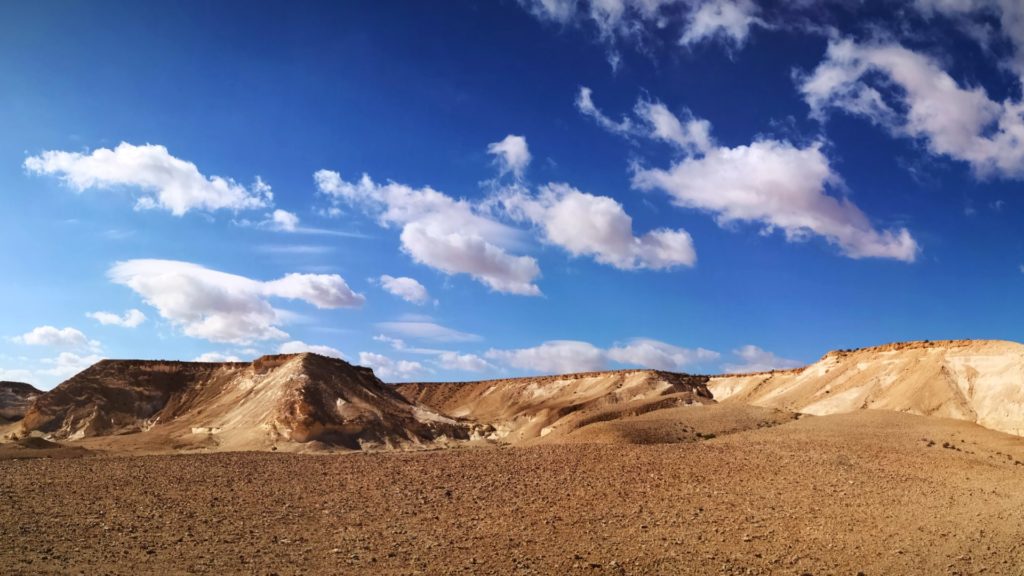I have watched Dune – Part 1 twice already. The first time was on a regular screen and second time on IMAX. I may have inadvertently given a really good scare to the people sitting next to me in the cinema the second time. A boy and his mother were talking nonstop, so about halfway into the movie (I was that patient only because it was the second watch) I turned and shushed them. Now I don’t know whether it’s because I am foreigner in China during Covid, or because it’s not common for people to shush other people in public here, or because I sort of look like a Fremen, but when I did that their eyes widened as if they had just seen a ghost. I like to believe it’s the third reason. Maybe for Dune – Part 2 I will color my eyes blue somehow, speak some Hebrew and give the people of China a true 5D experience.
Since I didn’t read the books, I’ve never considered myself a true fan of Dune. I did watch the 1984 David Lynch version (more than 20 years after it came out) and I did play the game Dune 2000, but I never really dove into the world of Dune the way I did with The Lord of the Rings for example. Nonetheless, the movie hit me on so many levels. Plus, it made me want to go on a challenging desert hike like I did a few years ago.
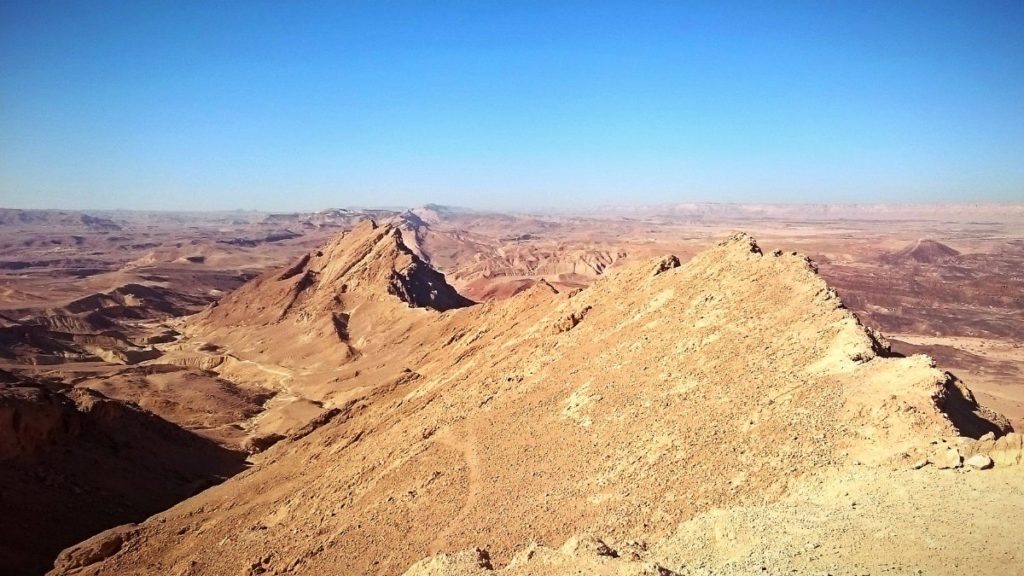
Even if you are only vaguely familiar with the story, you probably noticed it’s basically an analogy of Colonialism in the Middle East. If you really got into it, you may also know that Kwisatz Haderach – the name of a messianic figure with supernatural abilities which is prophesied to save the planet of Arrakis – is actually the Hebrew term קְפִיצָת הַדֶּרֶך (Kfitsat HaDerekh – the tightening of the road) borrowed from Jewish Lore.
While this is very cool, it is still not the Hebrew aspect I wish to talk about today. I want to talk about the three main elements in the story of Dune, which in my opinion are sand, space, and soldiers. In Hebrew they all originate from the same primal two letter shoresh ח-ל (Chet-Lamed). Let’s take a look.
Sand in Hebrew
The Hebrew word for sand is חוֹל (chol). The shoresh of this word is ח-ו-ל (Chet–Vav–Lamed) and it was formed by adding the letter Vav between the Chet and the Lamed. Inserting a vowel between the two consonants of a primal root was a very common practice in making the transition from two letter roots to three letter roots.
Though it is a masculine noun, its plural sands is חוֹלוֹת (cholot) which takes after the feminine plural form. The word ‘sandy’ in Hebrew is חוֹלִי (choli) and it’s interesting to see that the same i or ee sound is used to turn the noun into adjective.
The word ‘dune’ in Hebrew is חוֹלִית (cholit) and this is how the books and movies are called in Hebrew. By the way, in Chinese the movie is called 沙丘 (shā qiū) and I really like the font they made for the poster.

One more Hebrew word worth mentioning in this context is the verb חִלְחֵל (chilchel) which means to seep or to permeate into something, which is what water does when it comes in contact with sand.
Space in Hebrew
The Hebrew word for space is חָלָל (chalal). The shoresh of this word is ח-ל-ל (Chet-Lamed-Lamed) which originally may have meant ‘to make a hole’. Taking the last letter of a primal two letter root and replicating was another common practice in moving from two letter-based roots to three letter-based roots.
In Middle Hebrew the word חָלָל (chalal) used to describe an empty void or a cavity, but in Modern Hebrew it very often a short for החלל החיצון (HaChalal HaChitson) which means Outer Space.
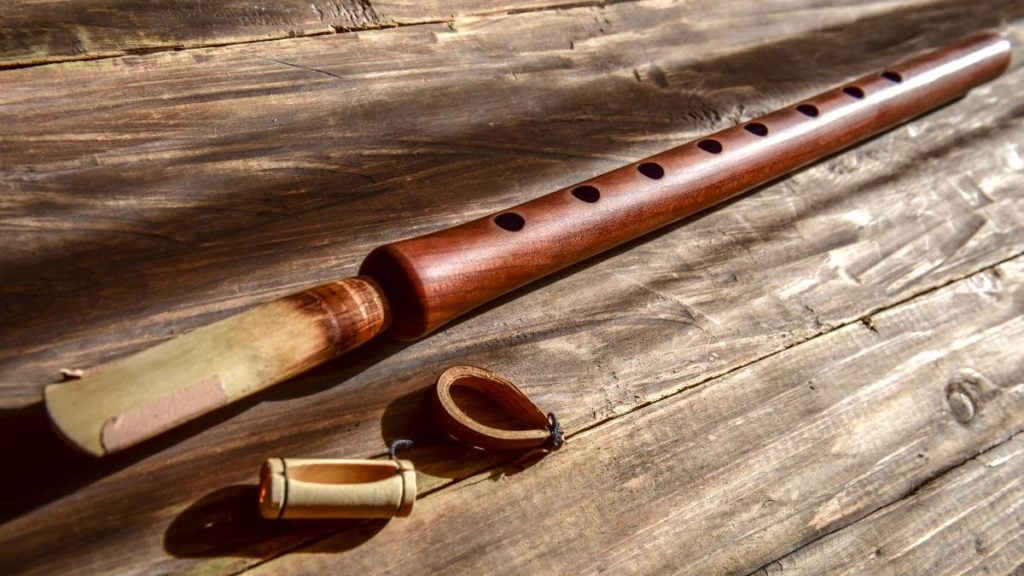
From the shoresh ח-ל-ל we get more relatives of the word חָלָל (space), such the word חָלוּל (chalul) which means hollow, the word חָלוֹן (chalon) which means window, and even the word חָלִיל (chalil) which means flute.
Soldier in Hebrew
The Hebrew word for soldier is חַיָּל (chayal). Just like in the shoresh ח-ו-ל (Chet-Vav-Lamed) with the letter Vav in the middle of it, here we have another semi-vowel letter – the letter yod – inserted between the two letters of the primal shoresh ח-ל (Chet-Lamed), to create the shoresh ח-י-ל (Chet-Yod-Lamed).
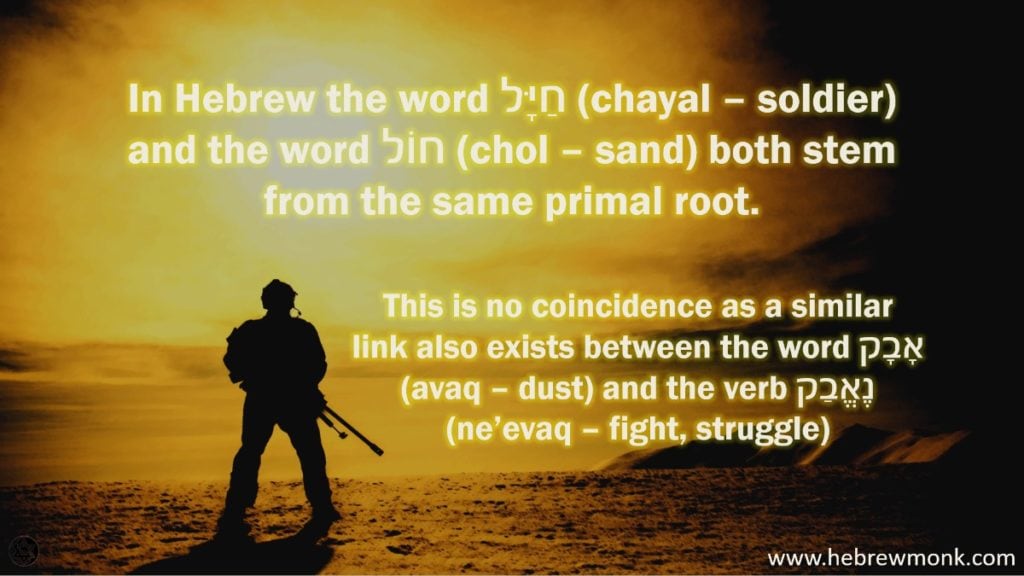
The word חַיָּל (chayal) is a Modern Hebrew word created by Eliezer Ben‑Yehuda. He based it on the Biblical word חַיִל (cha’yil) which employs the same shoresh. It Biblical Hebrew the word חַיִל (cha’yil) not only meant an army, but it was also used to describe skilled people who were able to fight, or to struggle with challenges successfully, and thus make great accomplishments. In fact, in the seventies the TV series Wonder Woman was known in Israel as אֵשֶׁת חַיִל (Eshet Cha’yil) – Woman of Valor.
By the way, if you think the link between sand and fight is accidental or very weak at best, know that a very similar association exists between word אָבָק (Avaq – dust) and the verb נֶאֱבַק (ne’evaq – struggle). They both share the shoresh א-ב-ק (Alef-Bet-Quf).
The unholy alliance of sand and space
On the surface, there is virtually no link of any sort between sand and space. But when you live in the desert, in very basic structures and with no advanced amenities at your disposal, the link becomes very clear. Anakin Skywalker can tell you all about it in one of the most poorly written and executed dialogs in cinematic history:
A very similar relation can be found between the word רוּחַ (ru’ach), which is Hebrew for wind, and the word רֶוַח (revach) which means gap. Both of them are based on the shoresh ר-ו-ח (Resh-Vav-Chet) and the connection between the two also entails causality or enabling of sorts, but in a much clearer manner.
There is actually one more concept which ties the phonetics of the word חוֹל (sand) together with the semantics of the shoresh ח-ל-ל (space). One of the sematic extensions of the shoresh ח-ל-ל, which fundamentally means cavity or void, is the idea of unholiness or non-religious, and it can be found in several words linked to this meaning. What’s really interesting is that the more the word sounds like חוֹל (chol – sand), the more it leans toward the meaning of plain, mundane, ordinary, or non-festive. And the more the word brings the shoresh ח-ל-ל and the two Lameds in to full use, the more it leans towards the meaning of blasphemy, defilement, or sacrilegious behavior.
The most obvious example for this is the expression יוֹם חוֹל (yom chol) which sounds and is written exactly like a day (יוֹם – yom) of sand (חוֹל – chol). What it actually means is an ordinary day which is not a holiday or the holy day of the Sabbath. A regular day with no special meaning or events can also be viewed as a kind of empty day and that accounts for the use of the shoresh ח-ל-ל.
Another good example is the expression שִׂיחָת חוּלִין (sichat chulin) which is how you say ‘small talk’ in Hebrew. The word שיחת means ‘a conversation of’ or ‘a talk about’ and חולין refers to thing that are unholy or not sacred. However, small talk is essentially an idle and empty conversation with no real substance you have in order to fill an awkward space, and there is your link to ח-ל-ל.
One more example is the word חִילוֹנִי (chiloni). In Middle Hebrew this word referred to an ordinary person who were not a כֹּהֵן (Kohen – priest), but in Modern Hebrew it simply means secular in the sense of not practicing or not being affiliated with or linked to any religion.
And finally, we get the verb חִילֵל (chilel) and the noun חִילוּל (chilul) which mean blasphemy, desecration, defilement, sacrilege, or violating something sacred. Here we have the shoresh ח-ל-ל making full appearance, and the entire act can literally be understood as something being voided of its holiness.
The sad symbolic link between soldiers and space
The word חָלָל (chalal) has one more meaning in Hebrew other than space, and that meaning is a dead or fallen soldier. This can be traced back to the fact that in ancient times most of the soldiers on the battlefield died either by the sword, a spear, or an arrow. Therefore, their body got pierced and as we said earlier, the earliest meaning of the shoresh ח-ל-ל (Chet-Lamed-Lamed) was to make a hole or form a cavity.
Another way to view this is through the eyes of a military leader. To them a dead man on the battlefield meant there was now an empty space in their formation, or a hole in their defenses they needed to fill.
From a spiritual perspective, the word חָלָל (chalal) in that sense may also refer to the dead body itself. After death, it can be seen as an empty shell, voided of the mind and soul who filled it, animated it, and gave it life.
However, most Israelis today probably do not associate the word חָלָל with the ancient meaning of piercing, nor do they consider the strategic viewpoint of the general or the loss of the spirit. To them, it reflects more of the impact they experience on a personal level, when instead of a loved one there is now great emptiness in their lives.
The generating power of sand and dancing
Apart from the word sand, the shoresh ח-ו-ל (Chet-Vav-Lamed) makes a very interesting appearance in the verb חוֹלֵל (cholel) which means to generate, to make something occur or come into existence.
For instance, the word ‘generator’ in Hebrew is מְחוֹלֵל (mecholel). Every time I come across this word, it reminds me of how we used to mess around with newbies or trainees when we went camping back in the days. We told them to go ask different people where the sack of “electricity powder” was, because we needed it for the generator. Some people spent entire afternoons looking for it…
From the meaning of generating, we also get the verb חָל (chal) – to start existing or taking effect. Even the word הַתְחָלָה (hatchala), which is based on the shoresh ת-ח-ל (Tav-Chel-Lamed) is traced back to the primal root ח-ל and therefore is a distant relative of the verb חוֹלל (generate).
Another Hebrew word based on the shoresh ח-ו-ל (Chet-Vav-Lamed), which has something to do with both sand and the act of generating something, is the word מָחוֹל (machol) – the noun form of dance.
Hebrew distinguishes between two form of dancing. The general term for dancing which usually refers to a casual dance anybody can do for fun is called רִיקּוּד (rikud). The word מָחוֹל (machol) is reserved for professional choreographed dancing, as part of an artistic performance which is more ritualistic by nature. In ancient times dancing rituals were a common way to try and generate things like rain, wind, better crops and even visions and revelations. That is probably why the verb חוֹלֵל (cholel) means both to dance and to generate. How cool is that?
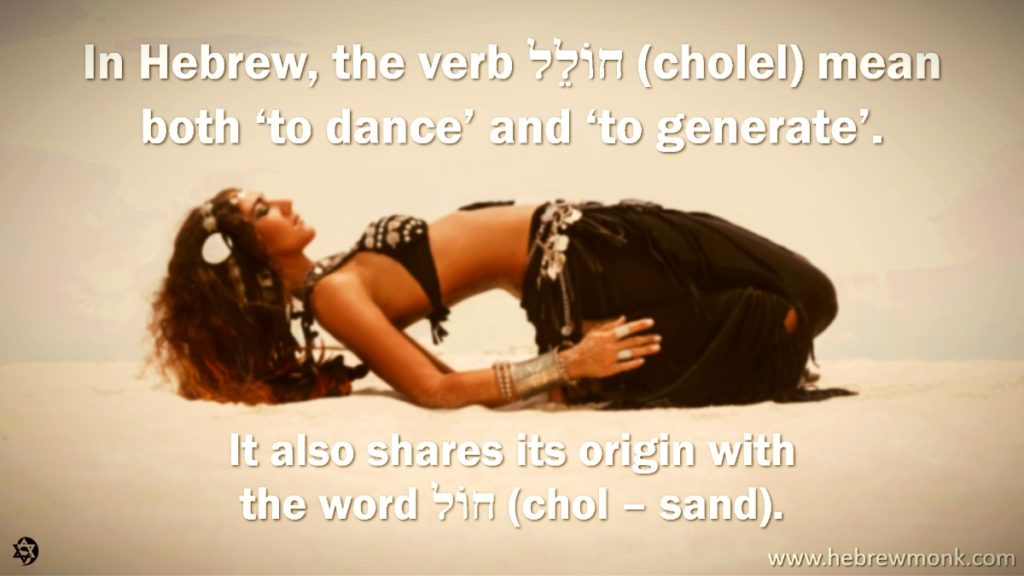
The word מָחוֹל (machol) is also the reason why the shoresh ח-ו-ל (Chet-Vav-Lamed) is also associated with the act of moving in circles, and that bring us to out next subject.
Circle in the Sand
When things start to move in circle interesting things begin to happen. Probably above all else, circular motion generates waves.
The Hebrew word for wave is גַּל (gal) and it is based on the primal root ג-ל (Gimel-Lamed). Just like the root ח-ל (Chet-Lamed), this root is also extremely fascinating and certainly deserves its very own post. It encompasses everything from stack or pile, through waves, rolls, wheels and cylinders, and even makes all the way to discoveries and revelations. I will definitely dedicate a post for it in the future, but for now I just want to dwell on the fact that it may very well be related to sand and space.
The letter Chet and Gimel represent phonetically related sounds, especially when you consider how Gimel without a Dagesh sounded in Ancient Hebrew (voiced velar fricative while Chet is a voiceless velar fricative). But what does sand have to with waves? Well, apparently sands dunes are waves moving in super slow motion. The following clip does an excellent job in explaining this:
When it comes to space the relation between the two roots might have something to do with the fact that when you roll something on itself (in Hebrew גָּלַל – galal) you get a cylindrical space (in Hebrew חָלָל – chalal). The word for cylinder in Hebew in גָּלִיל (galil) and it is very close to the word חָלִיל (chalil) which means flute. What is a flute if not a hollow cylinder?
By the way, one of the possible origins of the name of Jewish traditional bread known as חַלָּה (challah) is the circle it is shaped into.

But you have to admit it is also a very wavy (and weavy) kind of pastry, no?
Sickeing signs
Other than ח-ו-ל (Chet-Vav-Lamed), ח-י-ל (Chet-Yod-Lamed) and ח-ל-ל (Chet-Lamed-Lamed), there is one more Hebrew root which quite possibly have derived from the primal root ח-ל (Chet-Lamed) and that is the shoresh ח-ל-ה (Chet-Lamed-Heh). Nowadays, this shoresh is mostly associated with sickness and disease, but the further you go back in time, the more it is also associated with pain, weakness and even fear.
In Biblical Hebrew, we can find the word חִיל (chil) in the sense of tremble, the word חָל (chal) in the sense of fear, and the word חַלְחָלָה (chalchala) in the sense of fear, tremble, shock, horror, and disgust. For me personally, the most obvious suspect for using these roots for these meanings is the shoresh ח-י-ל (army and fighting). Who knows, maybe this is an early indication or acknowledgement of PTSD.
Speaking of the shoresh ח-ל-ה and sickess, I want to end this article by saying that on a personal level, watching the movie Dune – Part 1 really made me homesick. I won’t go into the details of why and how, but it helped realize I will have to leave China in the near future and go back to Israel. I still don’t know when exactly, and with the whole Covid-19 situation, it’s getting harder and harder to see the future.
Stay in Touch!
Get the next post from Hebrew Monk directly to you inbox!
Don't like emails? Subscribe to Heberw Monk's Telegram Channel instead.

